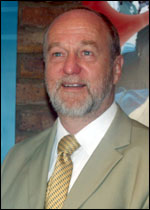Official opening of SAEON Summit
|
Government's vision for environmental science
Highlights from the opening address by Mr Derek Hanekom, Deputy Minister of Science and Technology, SAEON Summit: 27 March, 2006
"Due to technological advances in Information and Communication Technology, we are now able to work with large, distributed and diverse datasets in order to analyse those for correlated trends and to synthesize the results so that our understanding of the complexity of the Earth's systems, and how these are changing over time and space, may be better informed, and so that we might be able to prepare to absorb or mitigate any harmful changes. The time is therefore ripe to take stock of what long-term datasets we have, what we can learn from them, what we are missing and what we should do to fill those gaps, if not during our own lifetimes, then at least for future generations.
"Secondly, the equipment, instrumentation and methodologies for Earth and Environmental Observation have seen dramatic advances, so much so that we are today able to continuously measure even unseen and unimaginable details, either by direct observations or by indirect and space-based technologies. This is matched by advances in computation that allows for data mining and modelling of complex systems. The time is therefore ripe to establish comprehensive and coordinated observation systems operating at different scales of intensity and coverage, from Sensorwebs to satellite images, and to deliver useful and reliable information derived from those systems.
"Thirdly, science is a cultural dimension of society, and can therefore not escape from societal change such as what we have so dramatically experienced in South Africa. The democratisation of South Africa is a particularly strong driving force in science at large, but very specifically also in Environmental Science. Issues of transformation such as environmental justice, capacity development, racial and gender representativity, transparency, accountability, sustainable development and research ethics have become non-negotiable agenda items for Environmental Science."
"The time is ripe to take stock of what long-term datasets we have, what we can learn from them, what we are missing and what we should do to fill those gaps, if not during our own lifetimes, then at least for future generations."
"Global developments such as the Internet, environmental conventions, globalisation and global change are dramatically shaping our priorities and changing the culture of science, specifically with regard to collaboration and data sharing. It has become suicidal for an individual, an organisation or a country, to resist joint research projects or to restrict access to important datasets and information - this would have serious negative consequences for its scientific, environmental and economic competitiveness in the global arena.
"The time is therefore ripe for Environmental Science to rise to the challenge of demonstrating its relevance to society, by maximising the considerable historical and ongoing, but widely distributed government investment in environmental observation systems, and by rapidly transforming its culture into one of all-round openness."
"We believe that the correctness of our decision in 2002 to take the leading investment role in the development of SAEON, as proposed jointly by the research community and several government departments, has been confirmed by the consistent growth of SAEON and the ongoing support that it is receiving from all its stakeholders and participants."
"It is also important for us to note that SAEON does not dictate an agenda to the rest of South Africa, but that it obtains its frameworks jointly from science and society, with government representing the latter on the organisational structure of SAEON.
"The pursuit of these frameworks, the focus around the SAEON nodes, and the collaborative work required for the delivery of information based on SAEON data, will automatically lead to voluntary coordination and congruence of our national environmental observation effort, reducing unnecessary effort and filling the gaps that are caused by the current fragmented approach. The longer term outcome will surely be to raise our current environmental science effort to higher levels of excellence, relevance and cost-effectiveness."
"SAEON is unique in its composition as a network organisation, standing squarely in the middle of the Earth Observation arena and functioning as an agent of government at large."
"It should therefore be clear that for a large number of government priorities, such as climate change, food security, population health, land reform, economic development, waste and pollution management, energy supply and environmental security, where there is a significant reliance on Environmental Science to charter guidelines for sustainable development, our vision includes the integration of natural and social sciences in ways that will be appropriate for developing comprehensive and durable policies and strategies.
A concerted effort will be required to break down the barriers for this to happen. It is therefore gratifying to note that such discourse will be attended to during the course of the SAEON Summit, and is already integral to SAEON's frameworks."
"If society accepts sustainability as a goal, then it must develop economically and socially in a way that inspires and promotes innovative plans and actions to sustain life on Earth, while relying on science to contribute tools, technologies and information to promote sustainable development, as well as monitor the ecological footprint of development over space and time."
Download a complete version of the speech











